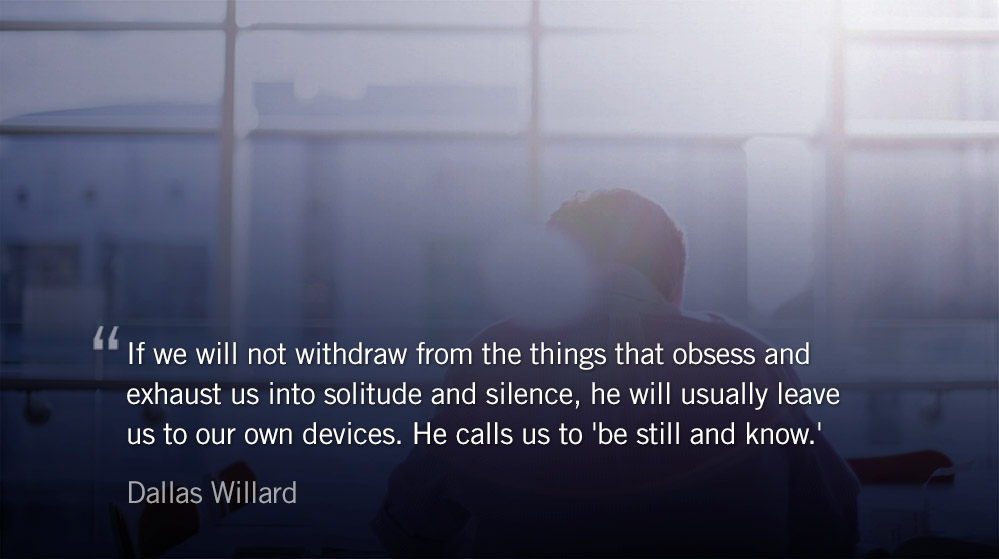“Our language has wisely sensed these two sides of man’s being alone,” observes Paul Tillich. “It has created the word ‘loneliness’ to express the pain of being alone. And it has created the word ‘solitude’ to express the glory of being alone.”
Once a spiritual discipline, silence is now more likely to be viewed as the uncomfortable penalty for those who do not have enough to do. It is rare to enter a coffee shop or store that doesn’t have music playing. Our phones provide an endless torrent of notifications. Vocation and family call for our attention. And, on top of everything, we feel the pangs of a disquieted soul searching for fulfillment in anything that captures our heart’s imagination.
Michael Fishbane explores the ancient discipline of silence in his book on Jewish theology, Sacred Attunement. Fishbane clarifies the difference between a simple lack of noise and the kind of silence where the soul finds renewal:
There are two kinds of silence. One of these is natural silence, and is characterized by the absence of noise. It is a modulation, a diminishment, a negative valence. The other kind of silence is spiritual, and is characterized by potentiality and anticipation. We sense this every time we watch a conductor or an ensemble gesture slightly just prior to the production of a sound; and we also sense it during moments of self-collection and focus, before something of significance is said to another person.
How can we hear the whispers of the Spirit without the cloister of silence? It is through the process of quieting our souls that we discover the true longings, idols, joys, and pains of our hearts. As we try to quiet our minds we observe where they drift—family issues, stress from our workplace, the desire for a new purchase—each mental journey offers an opportunity to pray.
As we offer up our stresses, celebrate our joys, and cultivate trust in our pain we find restorative silence. For the Christian the goal is emptying for the sake of being filled. “Silence frees us from the need to control others,” says Richard Foster, in Freedom of Simplicity. The same could be said for our need to control our own lives. Foster continues:
One reason we can hardly bear to remain silent is that it makes us feel so helpless. We are accustomed to relying upon words to manage and control others. A frantic stream of words flows from us in an attempt to straighten others out. We want so desperately for them to agree with us, to see things our way. We evaluate people, judge people, condemn people. We devour people with our words. Silence is one of the deepest Disciplines of the Spirit simply because it puts the stopper on that.
More than just how we interact with others, silence changes the posture of our own soul. “Indeed, solitude and silence are powerful means to grace,” observes Dallas Willard, in Spiritual Disciplines, Spiritual Formation and the Restoration of the Soul. “But we must choose these disciplines. God will, generally speaking, not compete for our attention.” Willard explains the benefits of cultivating restorative silence:
If we will not withdraw from the things that obsess and exhaust us into solitude and silence, he will usually leave us to our own devices. He calls us to ‘be still and know.’ To the soul disciplined to wait quietly before him, to lavish time upon this practice, he will make himself known in ways that will redirect our every thought, feeling and choice. The body itself will enter a different world of rest and strength. And the effects of solitude and silence will reverberate through the social settings where one finds oneself.
In this way the fulfillment, joy, and meaning we long for are not found in adding more noise, but in resting from the things outside of God that clamor for our attention. Silence is a habit of rest—drawing us back to the practice of the Sabbath day.
“Sabbath is a declaration of freedom,” Timothy Keller asserts in his article, Wisdom and Sabbath Rest. “Sabbath is about more than external rest of the body; it is about inner rest of the soul. We need rest from the anxiety and strain of our overwork, which is really an attempt to justify ourselves—to gain the money or the status or the reputation we think we have to have.”
The “glory of being alone,” to use Tillich’s words, isn’t found in ourselves, but in uniting ourselves with the peace of Christ. There we find what the noise of the world is insufficient to provide. There the faithful are renewed, according to Isaiah’s prophecy, “In repentance and rest is your salvation, in quietness and trust is your strength.”
Today’s Reading
Nehemiah 5 (Listen – 3:29)
Acts 15 (Listen – 5:43)
This Weekend’s Readings
Nehemiah 6 (Listen – 3:19) Acts 16 (Listen – 5:53)
Nehemiah 7 (Listen – 6:37) Acts 17 (Listen – 5:28)
The Weekend Reading List
- Silence is Praise by Erica Brown, for OnFaith.
- Spiritual Disciplines, Spiritual Formation and the Restoration of the Soul by Dallas Willard for The Journal of Psychology and Theology.
- Wisdom and Sabbath Rest by Timothy Keller, for Q.






